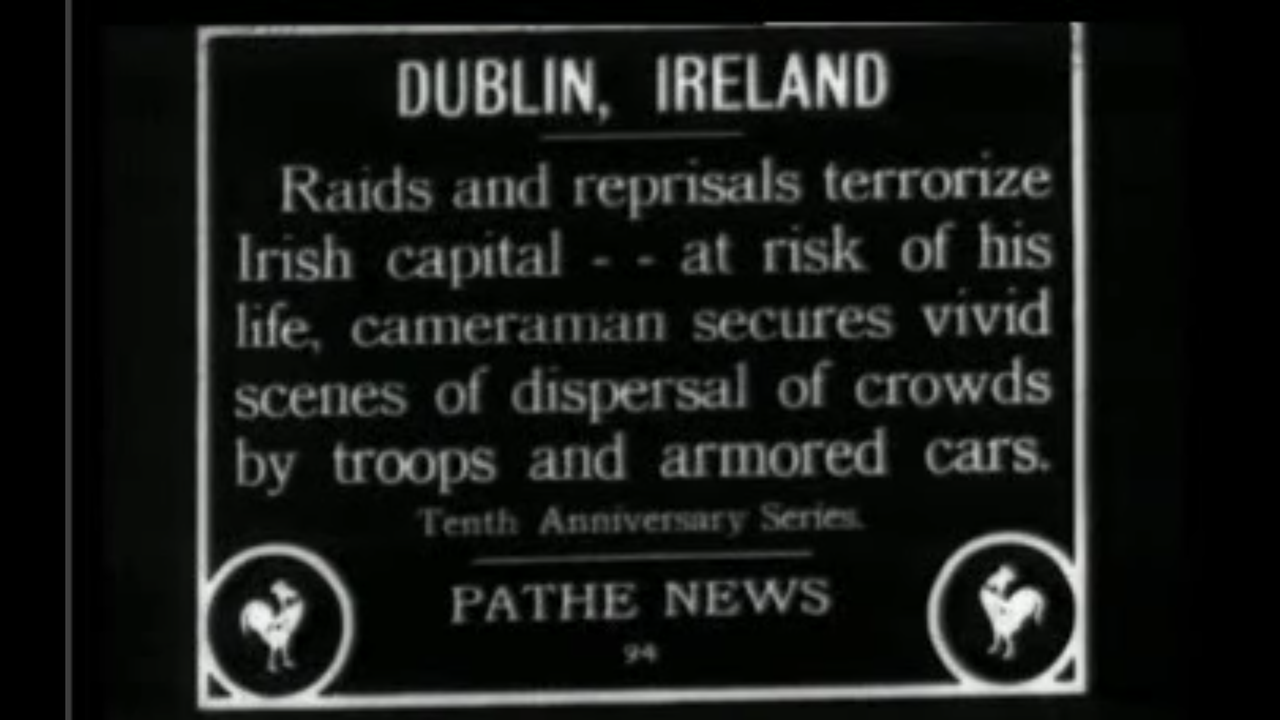
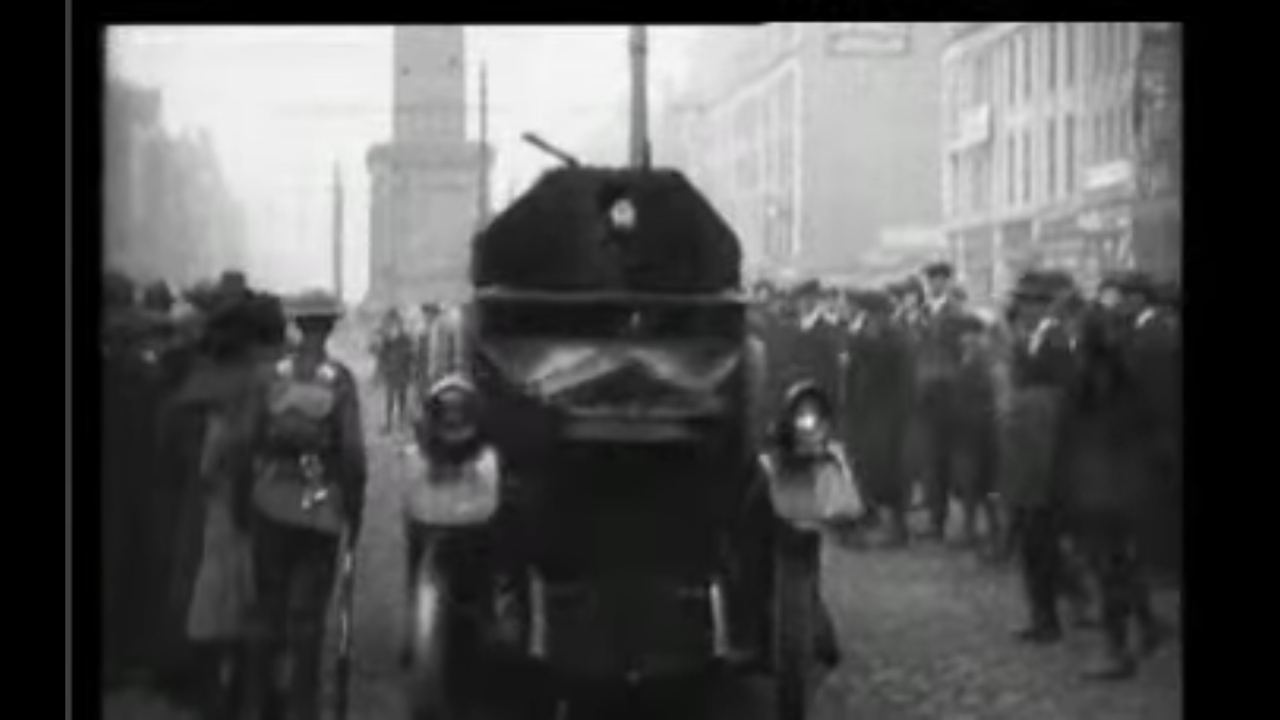 "The visible weakening of Great Britain during the Von Papen Wars period (early 1920s) led to overall instability in the international scene and in a de-polarisation of the diplomatic situation. Whereas Great Britain had, even after her sound defeat by Germany, served as a mighty economic bulwark and the 'Giant' of Europe, the loss of Ireland indicated that the feet of Albion may have been made of clay after all. Minor nations, who had tended to seek a potential alternative to the quickly rising Germany in Great Britain now were forced to reconsider their allegiances. Some sought to befriend the rising Power; some stuck to their guns and remained allied to the British Empire; some sought alternatives in Powers such as France, who had rekindled her ages-old feud with her Teutonic neighbour. The ideal of the
"The visible weakening of Great Britain during the Von Papen Wars period (early 1920s) led to overall instability in the international scene and in a de-polarisation of the diplomatic situation. Whereas Great Britain had, even after her sound defeat by Germany, served as a mighty economic bulwark and the 'Giant' of Europe, the loss of Ireland indicated that the feet of Albion may have been made of clay after all. Minor nations, who had tended to seek a potential alternative to the quickly rising Germany in Great Britain now were forced to reconsider their allegiances. Some sought to befriend the rising Power; some stuck to their guns and remained allied to the British Empire; some sought alternatives in Powers such as France, who had rekindled her ages-old feud with her Teutonic neighbour. The ideal of the Kerneuropa
seemed to be hanging over the precipice, as new alliances were negotiated. Notably, the two traditional 'poles' of European diplomacy (the Anglophile and Germanophile bloc) were shaken to the core."
"During this period, the uncertainty that resulted from the fundamental upsetting of British power led to a significant reshuffling of the political landscape in Great Britain. With Ireland leaving the Crown officially in early 1924 (and promptly descending into a three-year civil war), British Unionism was considerably threatened - and its proponents reacted immediately. It is during this period that political movements such as the 'Great Idea' came back to the forefront, with political parties such as the National Democratic and Labour Party (NDLP) and the Labour Unionists (LU) attracting more and more voters."
"Germany, at the time, had her own problems[...]"-Jeremy DeWiers PhD (Ox),
The National Labour Movements before Mosley's Folly, Oxford: Blackwell 1989
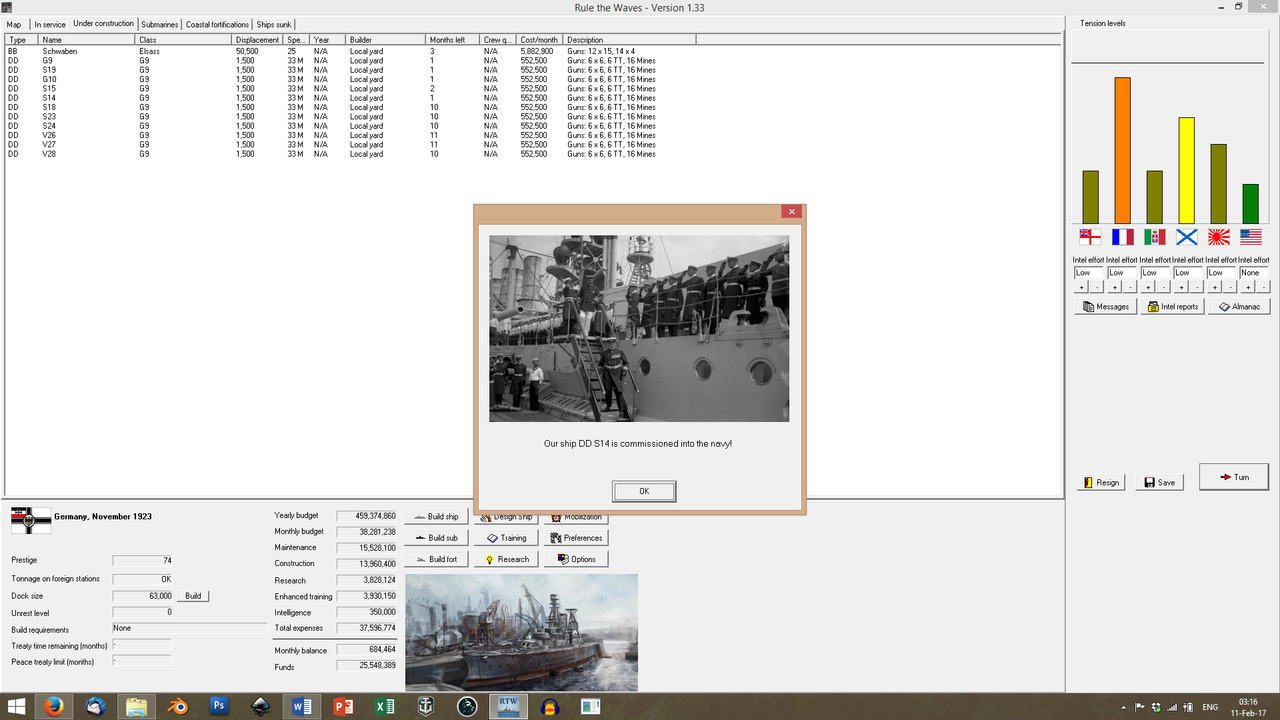
With Great Britain in the midst of a national existential crisis, the German
Admiralität celebrates the commissioning of the first
G9-class Zerstörer in November 1923.
Schwaben is almost ready to leave the docks (commissioning is planned for January) and a
second bloc of
G9s is laid down to further reinforce the German fleet. The performance of the prototypes is
perfectly satisfactory. Some thought is given to upgrading the second line of
G9s with more torpedo tubes, but the engineers quickly determine that, with their heavy primary armament, such a modification would make the
G9s considerably overweight and cost them in speed and stability.
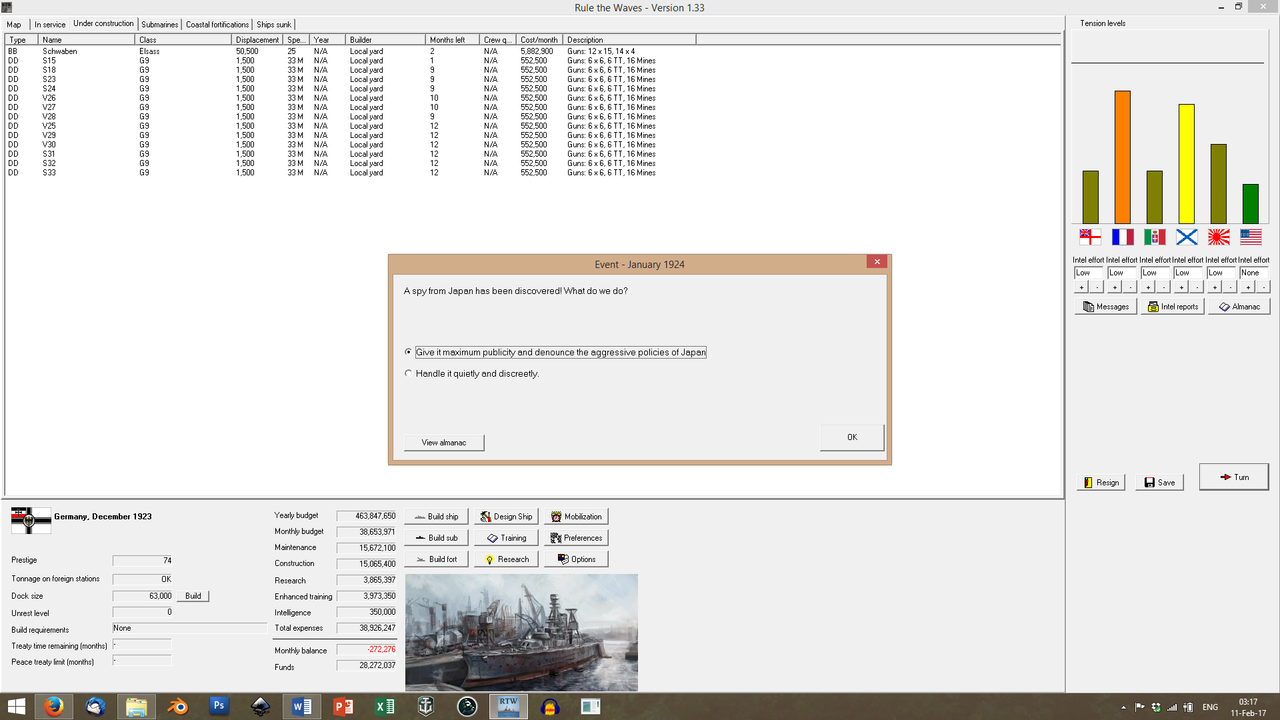
During the shakedown cruise of the
G9, a Japanese spy is caught during a honeypot scheme to secure access to the blueprints of the new German
Zerstörer. The resulting inquiry is badly handled by both the
Admiralität and Streseman. Tensions with Japan rise; interestingly, Russia seems to support the Japanese. Military intelligence suspects that it may have been a joint scheme; or that Russia is just trying to capitalise on Germany's embarrassment.
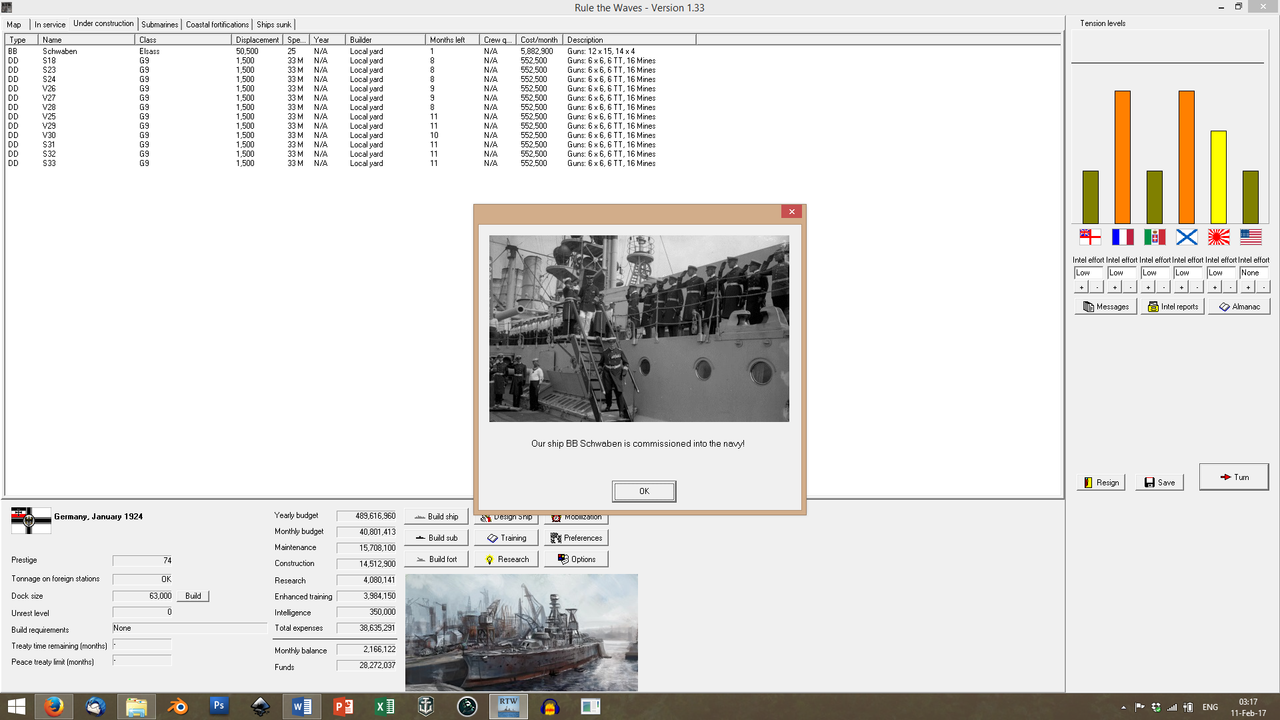
The point is that, during the January commissioning of the
Schwaben, tensions with France and Russia are as high as ever. Bismarck's nightmmare (a two-front war, against France and Russia simultaneously) seems to lie somewhere in the very near future. It is
imperative that the two Powers be kept from formalising their support of each other; it is towards that goal that Streseman focuses his efforts.
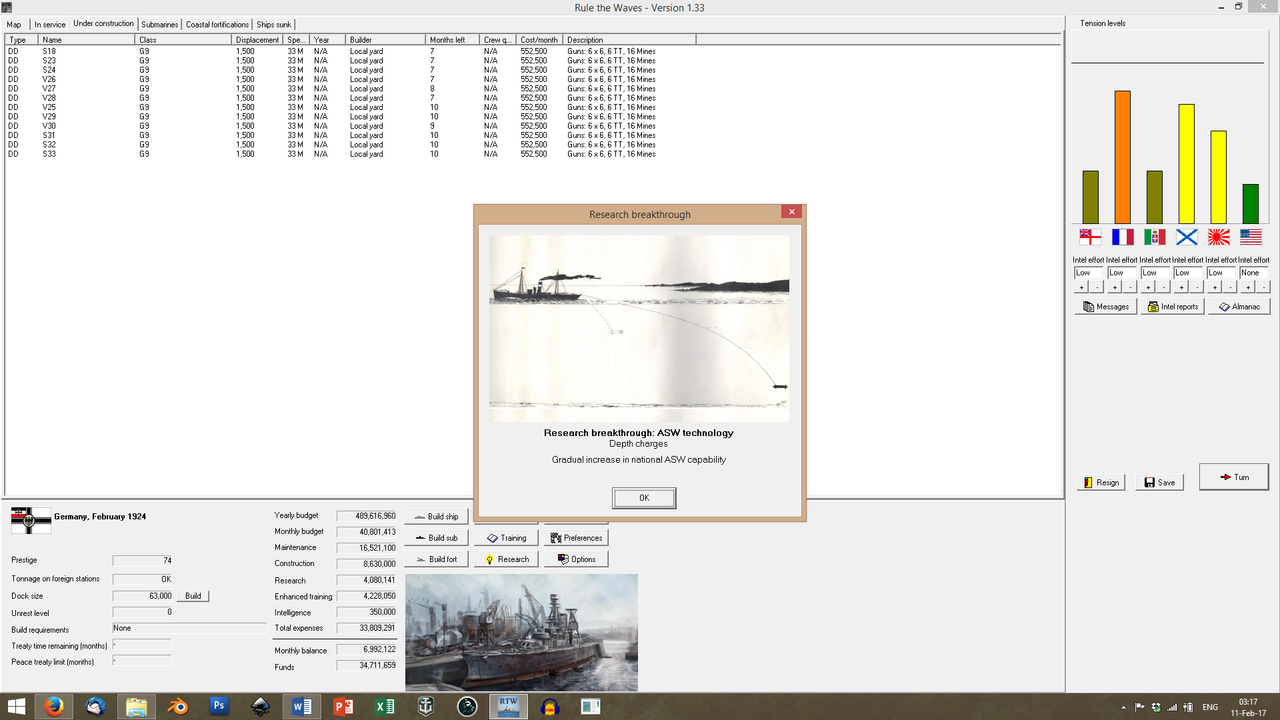
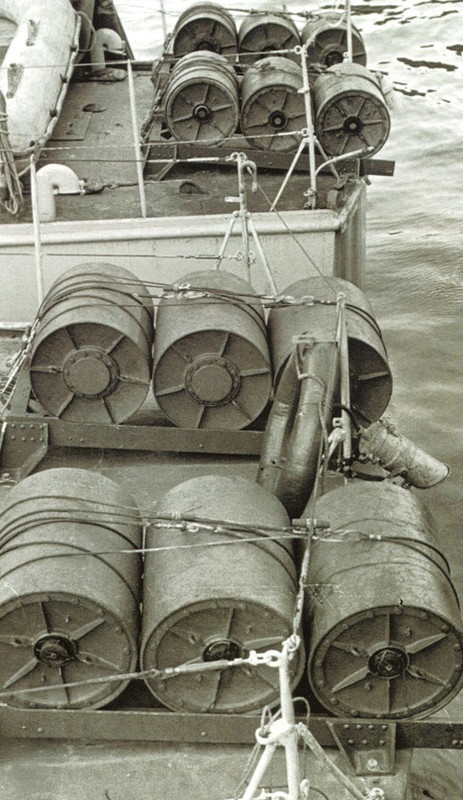
R & D provides the
Admiralität with designs for the new
Wasserbomben, and the
Piepers immediately begin receiving the new munitions.
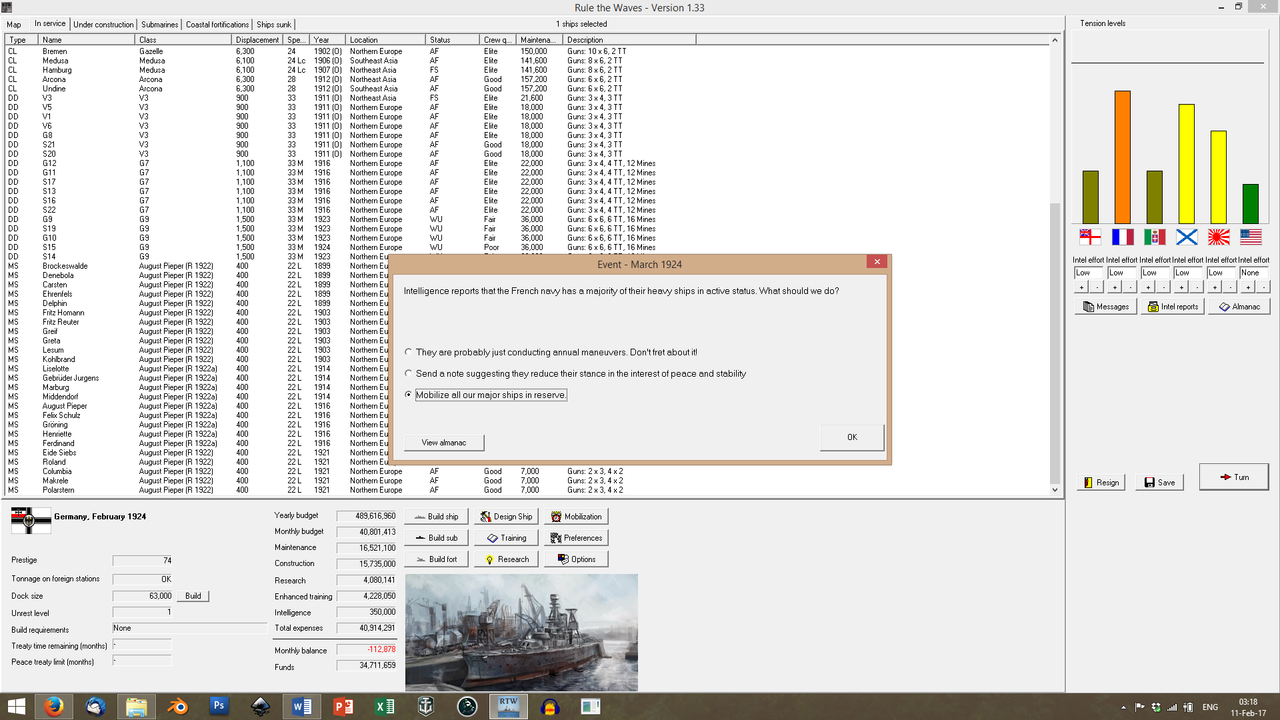
February 1924: Russia, thanks to Streseman's efforts, has backed down, just a bit. Military Intelligence, on the other hand, reports that the French fleet is partially mobilising, bringing several of their reserve-ships to full active status.
Streseman (and the
Admiralität) recommend calm. On the one hand, the French seem to be much more organised this time around: beginning training and mobilisation this early will guarantee that no ships will be deployed with untrained crews. On the other hand, however, the Marine Nationale remains a non-threat for the German Fleet (with the possible exception of the French submarine force). An overreaction at this point will only hasten the war, before the new
Zerstörer are ready to contribute.
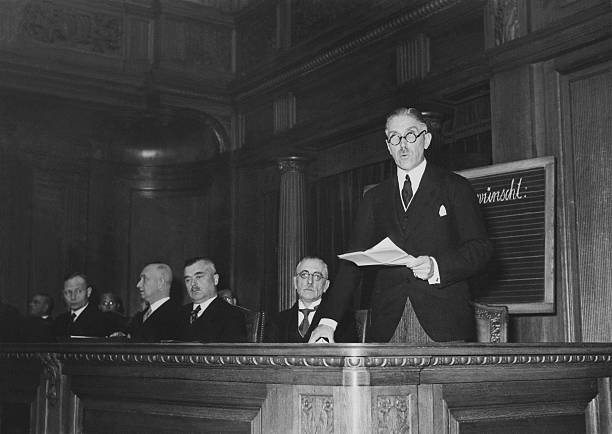
In response, von Papen proceeds to give an interview, in which he states his intention to mobilise all German ships in reserve, to counter French aggression.
The French are
confused, and tensions remain stable, while their Intelligence seeks to make sense out of the German Chancellor's rantings. During that time, Hindenburg and Galster less-than-patiently try to explain to their
Reichskanzler that Germany
has no ships in reserve or mothballs. The
entirety of the existing German
Hochseeflotte is in active service.
Dummkopf.
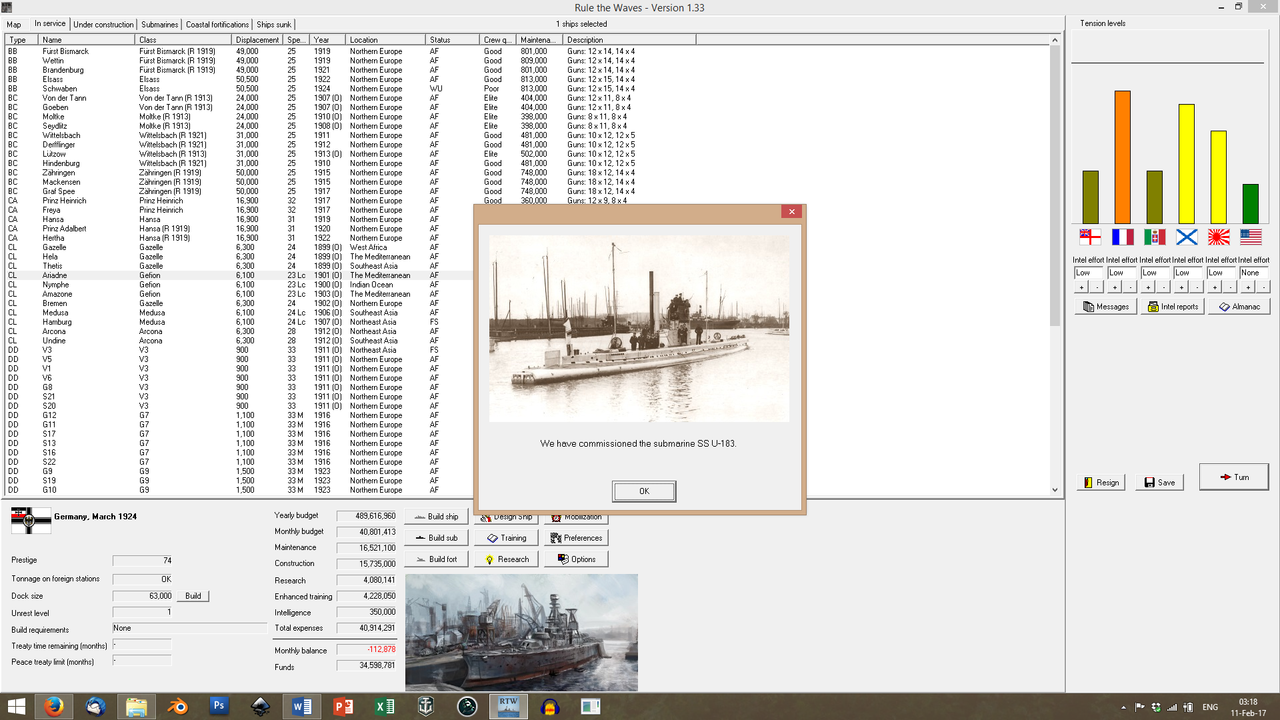
A batch of 12 subs leaves the yards in March; even more are in production...
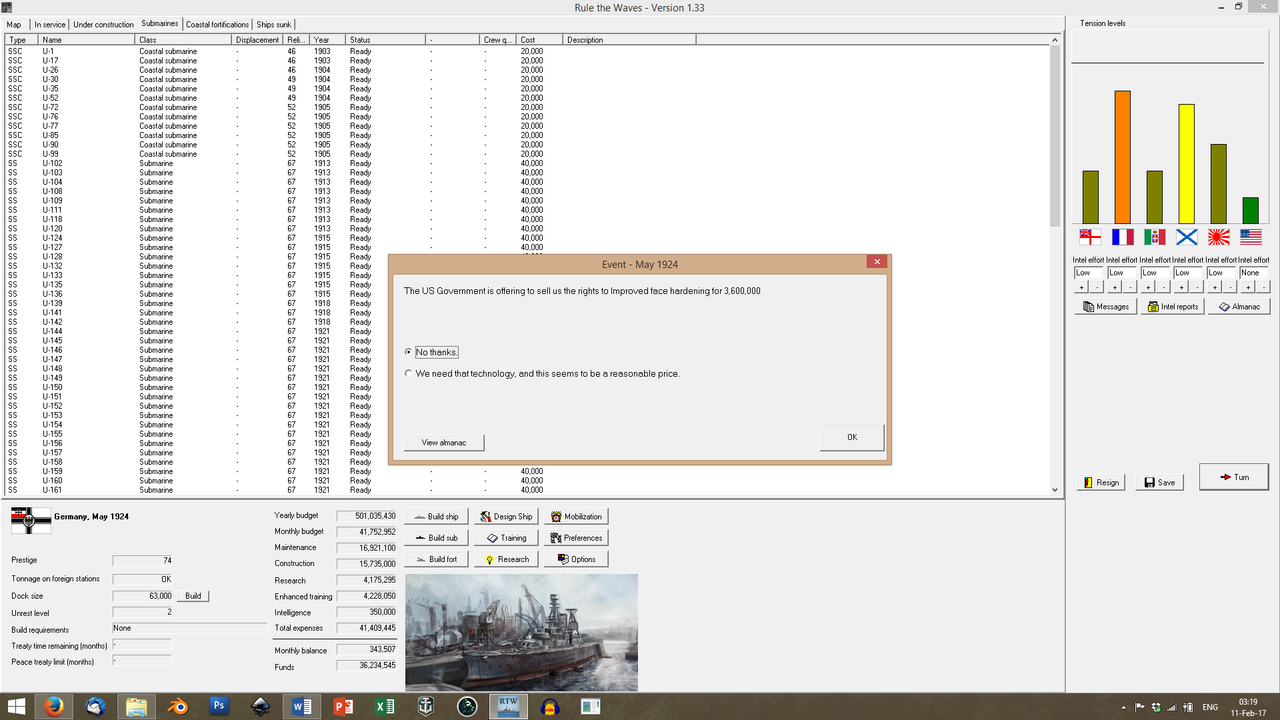
...while the
Admiralität turns down a suggestion by the Americans to buy the formulas that the Yanks are employing on their armour hardening. Firstly: if you think Krupp will fail to provide us with properly hardened steel during the upcoming months,
Amerikaner, you are woefully unfamiliar with the concept of
Deutscher Stahl and everything that goes with it; secondly: we are about to embark on a tricky war, and our big armoured battlewagons have just left the slipways. Anything that would be using this technology is two-and-a-half years in the future; our priority right now is to gather up a nest egg, to get us through the war. We don't have the money to spare, sorry.
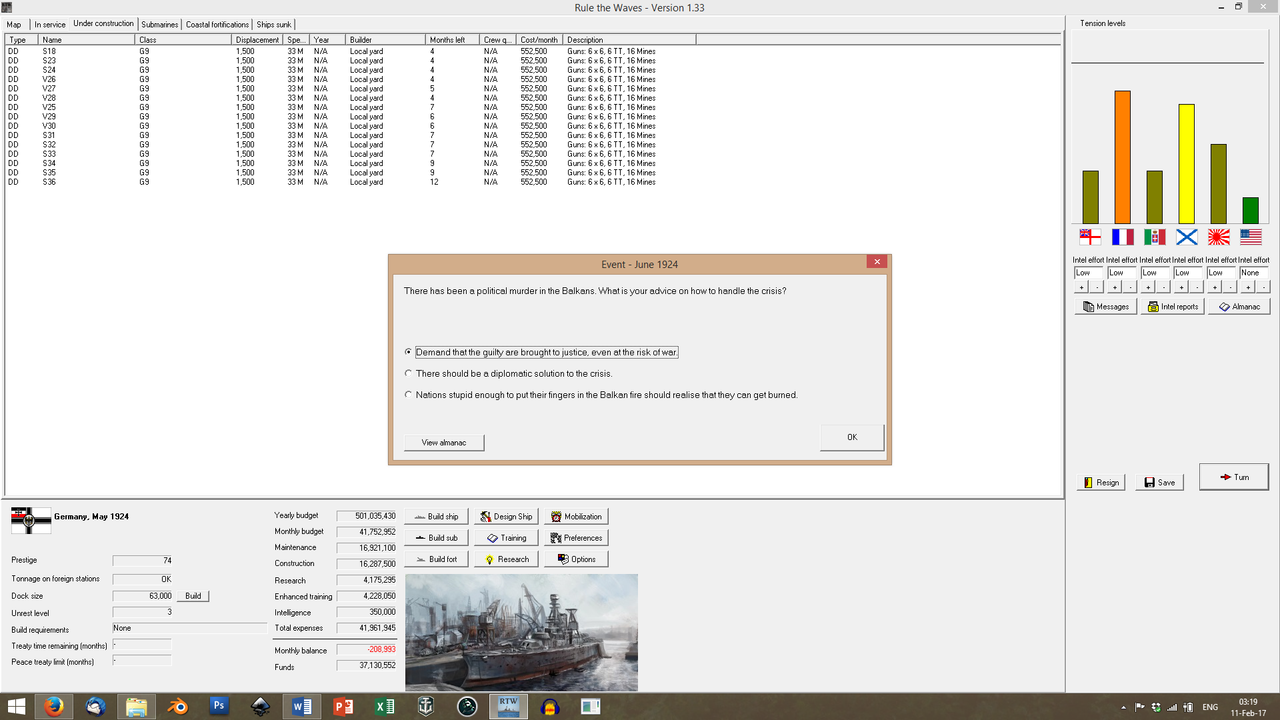
May 1924: and the German Ambassador to Greece is shot six times in Syntagma square, just in front of the Royal Palace. He is rushed to a hospital, where he will lie for two days; he will expire on the morning of the 25th of the month. His murderer is 27-year old Ioannis Mauromatis, a Law student of Greco-Serbian descent.
Germany is, of course, livid; and von Papen's polemic is near-hysterical. The Kaiser (being King Konstantine's brother-in-law), attempts to ease the situation through personal communication; thankfully, the Greco-Germanic alliance, which has secured the Rhodes oil fields for the
Reich for almost a decade, now, survives the ordeal. The Kaiser vetoes von Papen's demands that German agents should be deployed to 'assist' with the Greek investigations; but the damage in the international scene has already taken place.
The French and Russians observe the German 'proposed interventionism' with horror. A few days of tense, powder-keg diplomacy follow, during which the
Admiralität watches and waits...
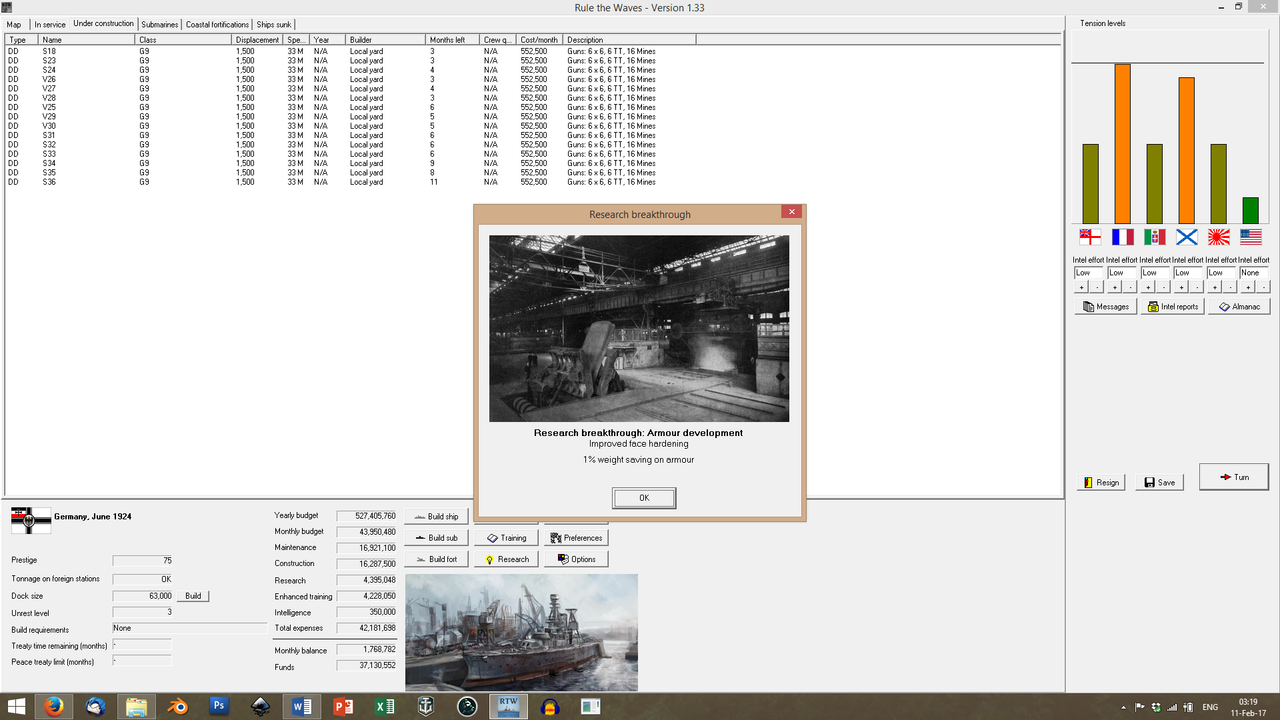
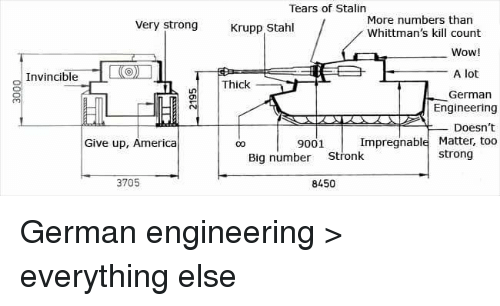
See? Told ya, 'Muricans. German Steel is best steel.
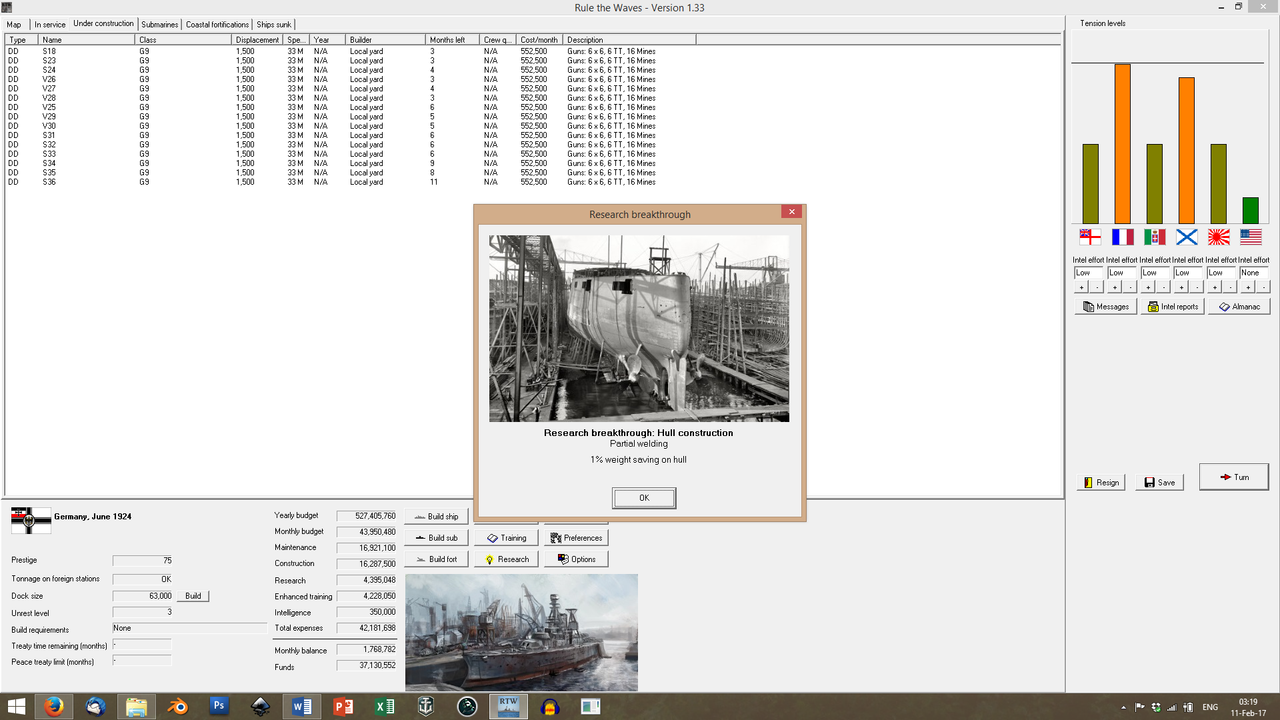
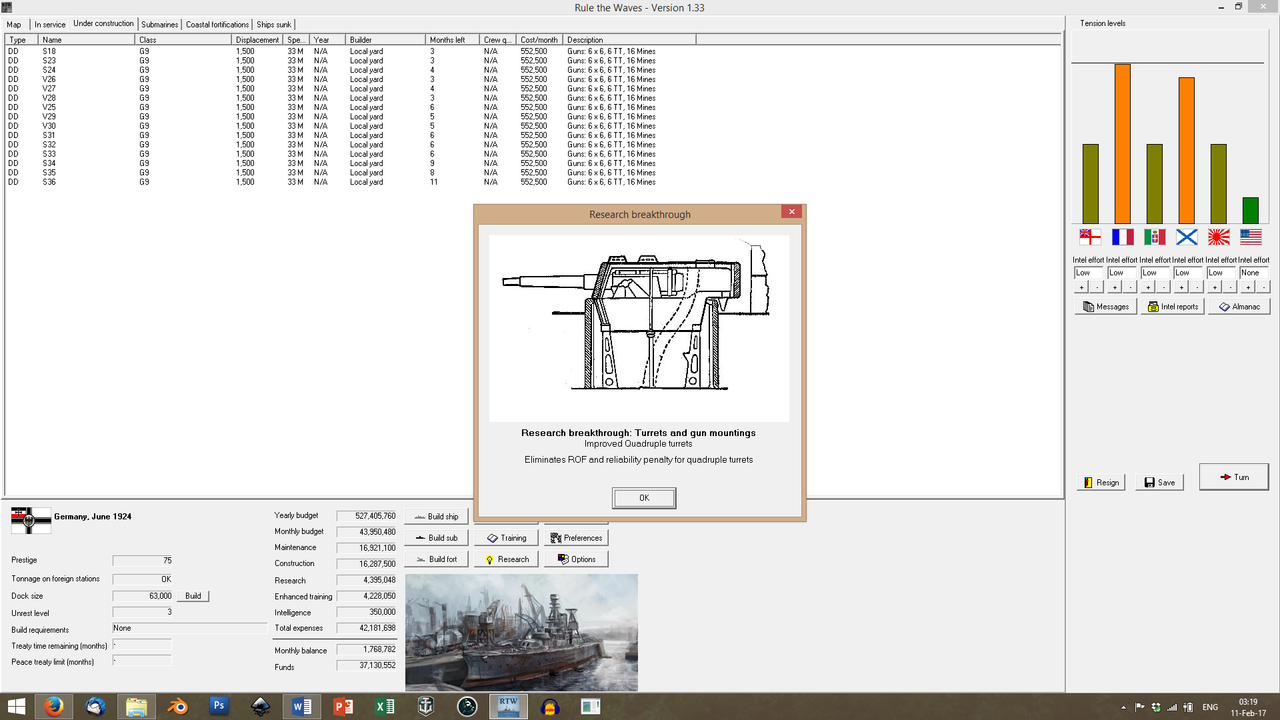
This also looks
brilliant, although quad turrets are still...
too crazy for the Germans.
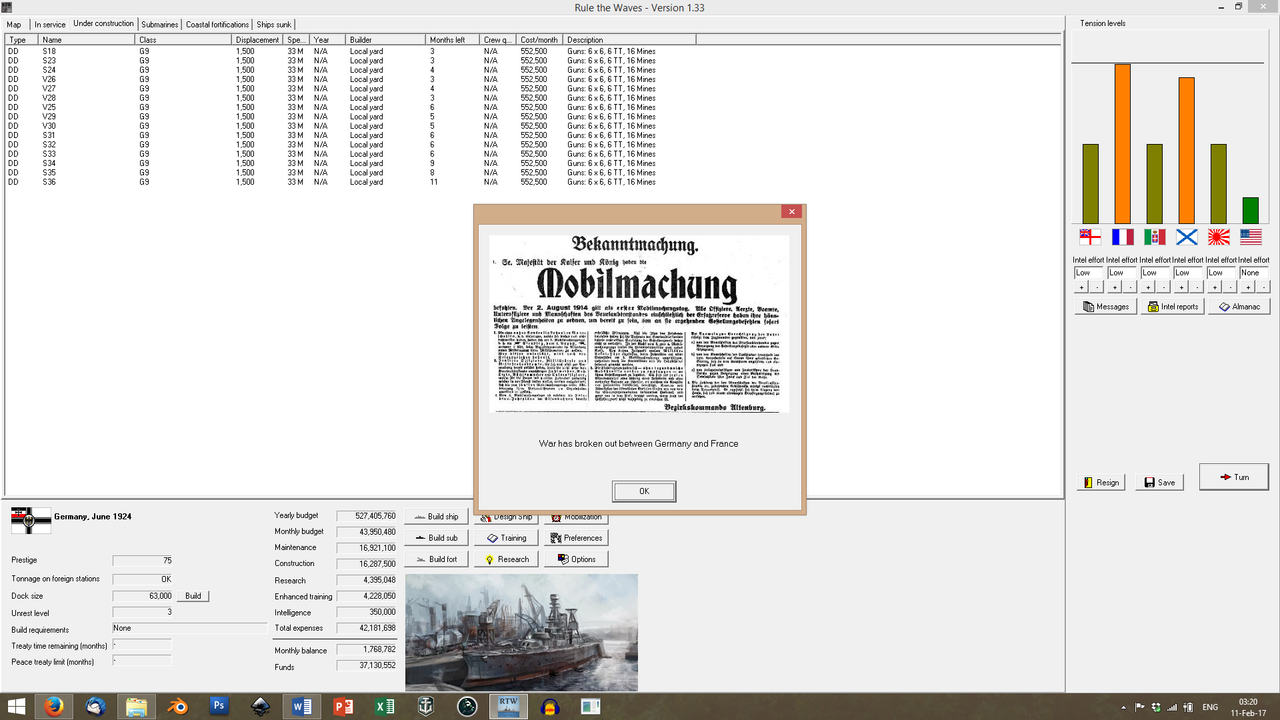 ****
****.

Here we go again. Peace lasted for
less than two years.
On the morning of the 3rd of June, 1924, France declares war. Tensions with Russia are
one tick away from exploding into the faces of the Germans too.
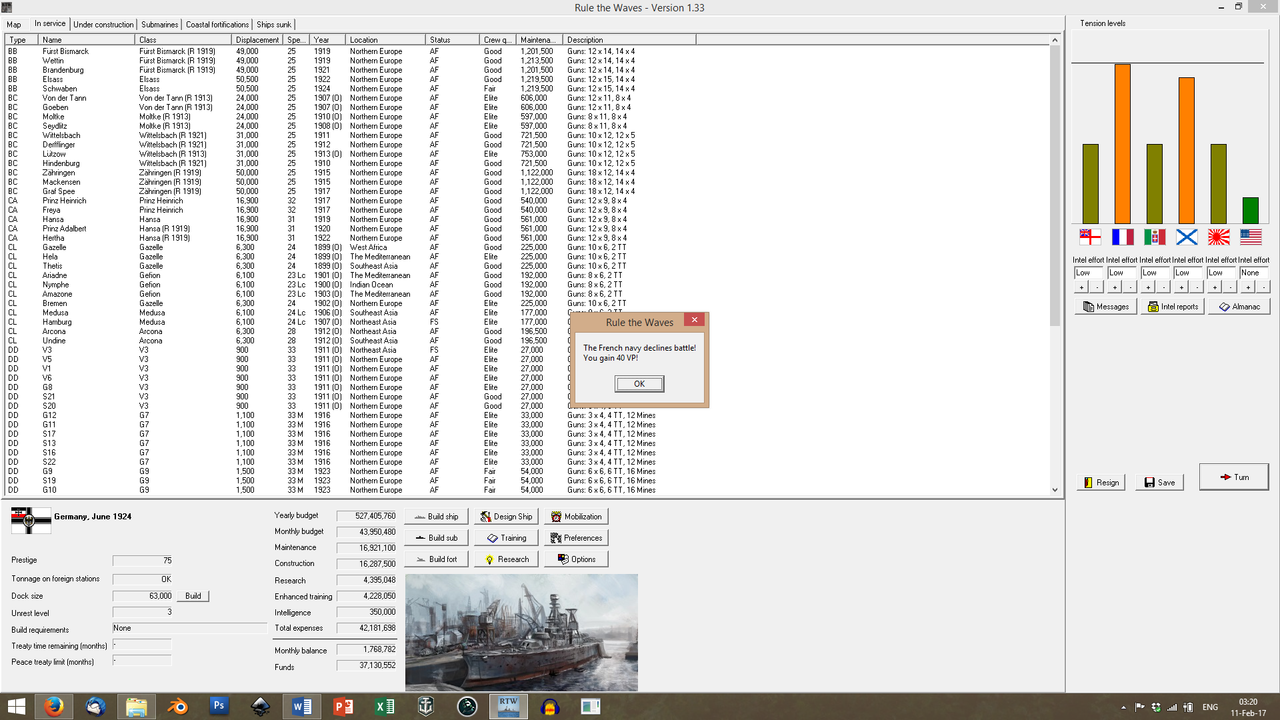
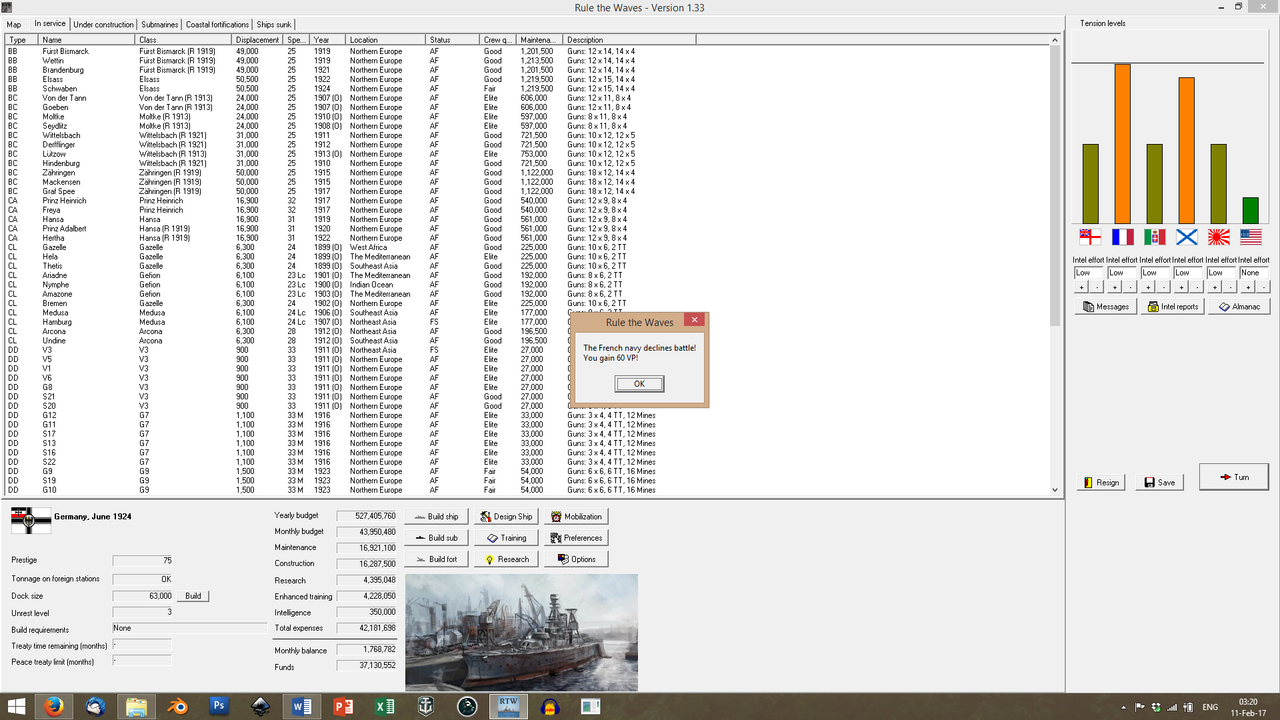
And it is clear that the French
know this and are
counting on it.
During the first week of the war, their forces probe German positions twice, but stubbornly refuse to engage the German intercepting squadrons: they are buying time. They are waiting for the Russians to come in and assist; and until that time, they seek to preserve their ships.
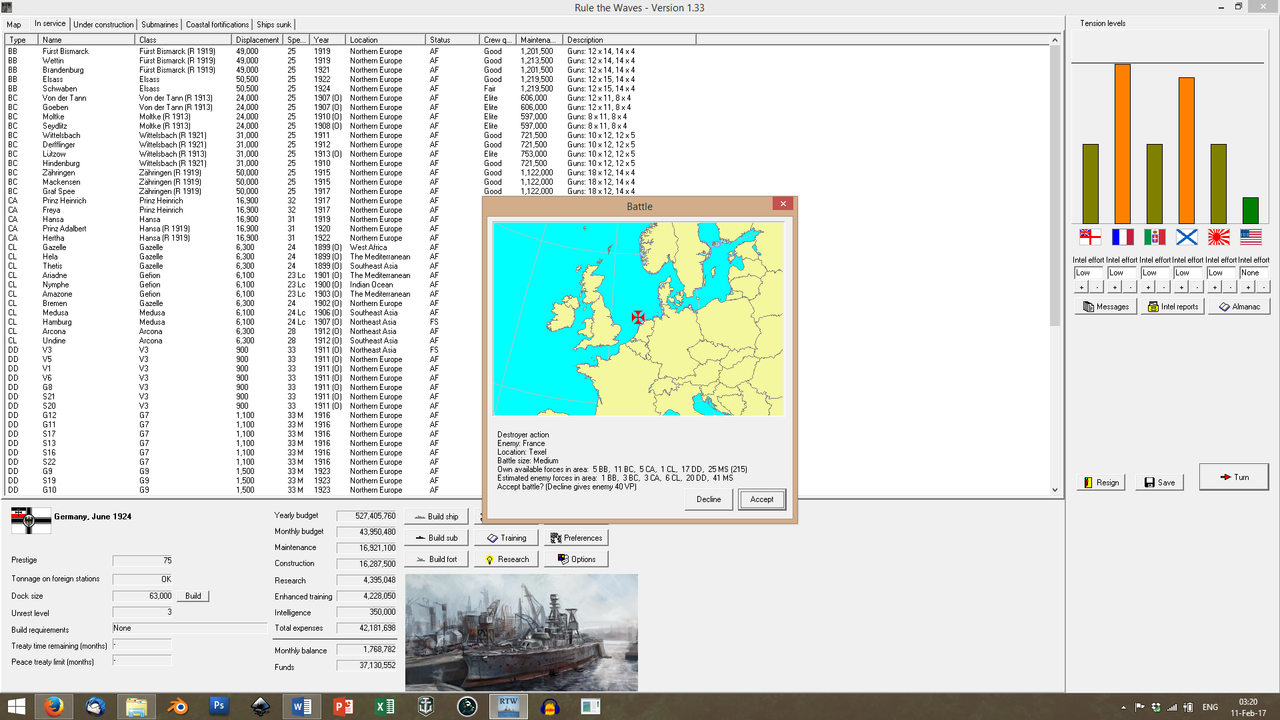
Their plans go somewhat awry on the 7th of June, when a scouting force of three
Mortier-class destroyers and a light cruiser attempt to sneak past Texel, utilising the early morning mists.
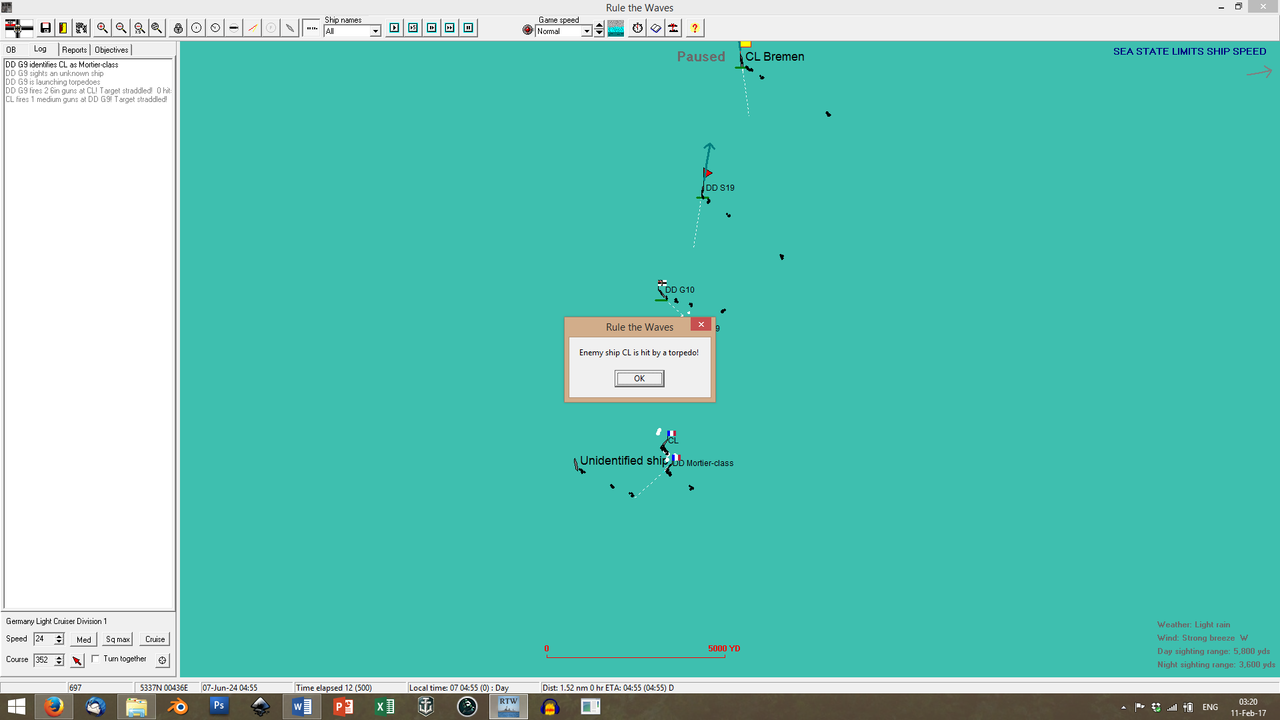
They are intercepted by old
Bremen, escorted by the two brand-spanking-new
Zerstörer G10 and
S19. The Germans have only a brief contact window and they do not dare pursue the enemy under the very poor visibility conditions (who knows what the French might have lurking further back), but they still manage to score a torpedo hit on the enemy light cruiser.
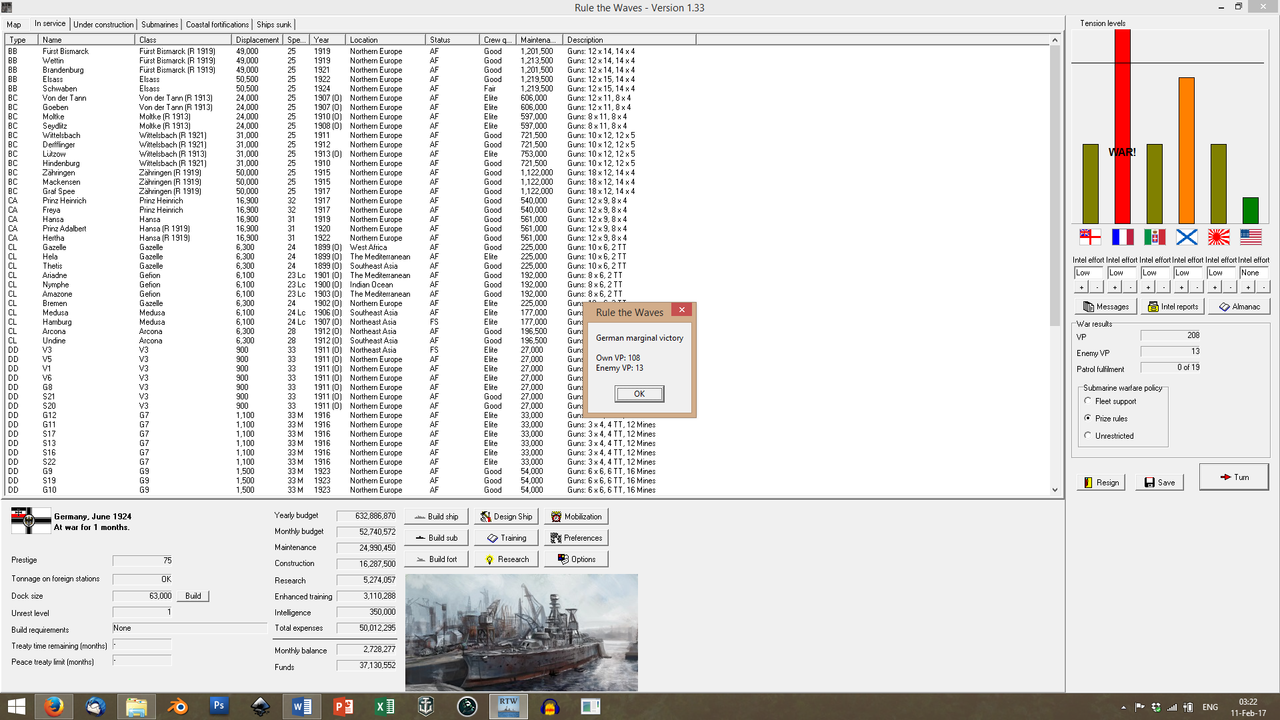
It's a minor victory and an anticlimactic baptism of fire for the
G9s, but it's a victory nonetheless.
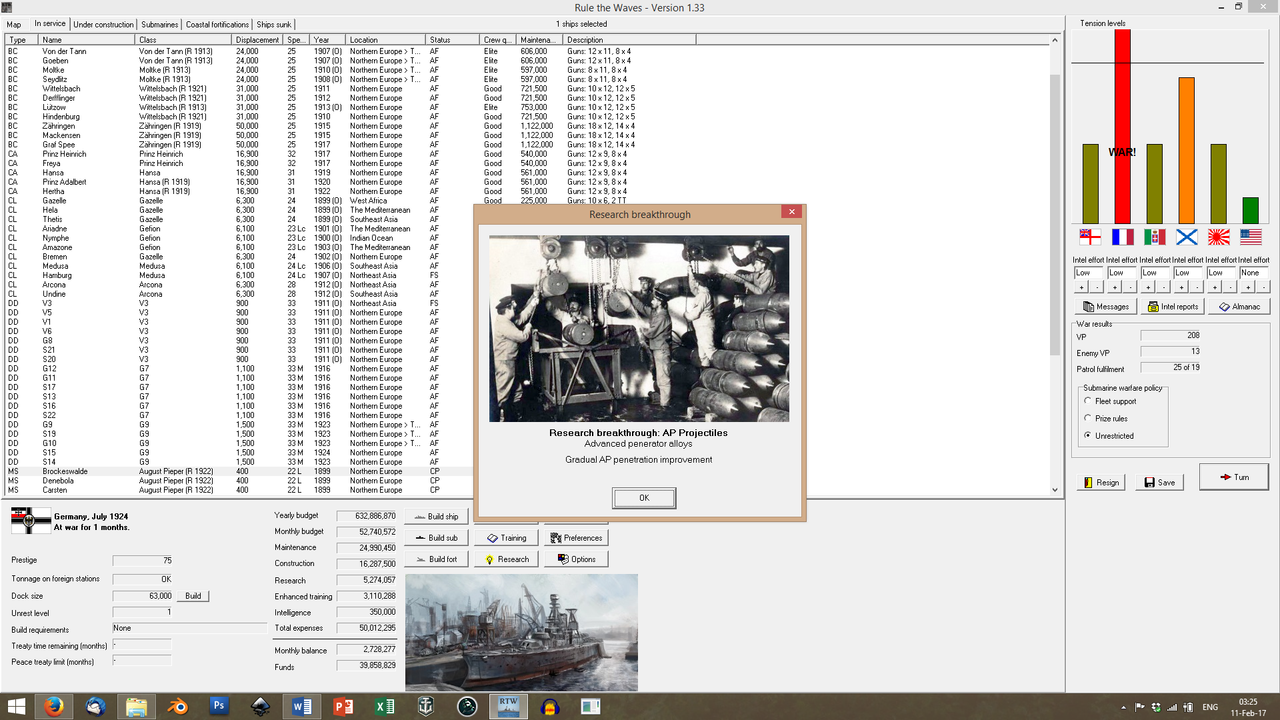
At this point, the
Admiralität scores a major intelligence success: observation zeppelins identify the French capital fleet massing in the northern Atlantic harbours. The French have emptied the Mediterranean of all capital ships.
Galster takes the opportunity, to utilise his obsolescent
Schlachtkreuzer. In the Atlantic, the
Von der Tann, Goeben, Moltke and
Seydlitz are greatly outclassed by anything the French can field against them. But in the Mediterranean, they are bigger and badder than anything the Fromage can bring against them. The four old Valkyries are separated and sent north of the British Isles, on a long curving course to Gibraltar. From there, they are rebased in Sardinia and Alexandria, locking down the Mediterranean for good.
At the same time, R & D is experimenting with the new hardened alloys for better AP penetration caps...
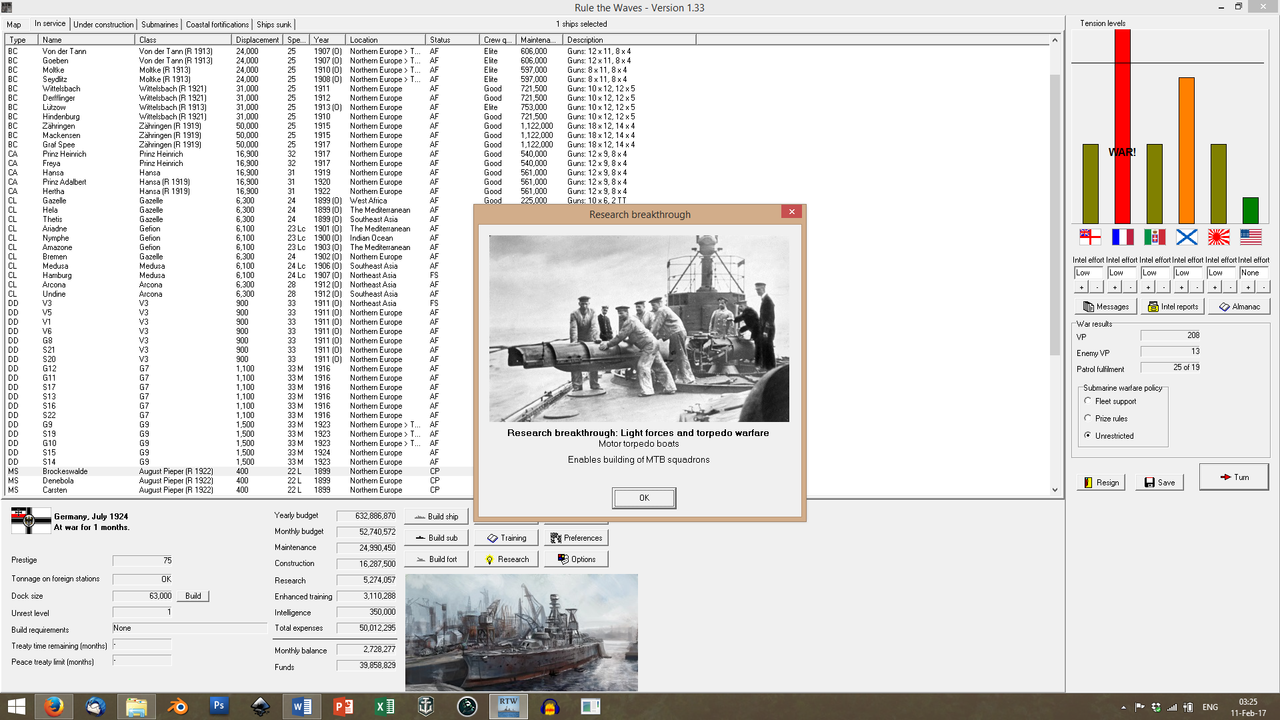
...and designs for a superlight torpedo-armed
Schnellboot are submitted for consideration. These new patrol craft can greatly assist the
Piepers in their patrols!
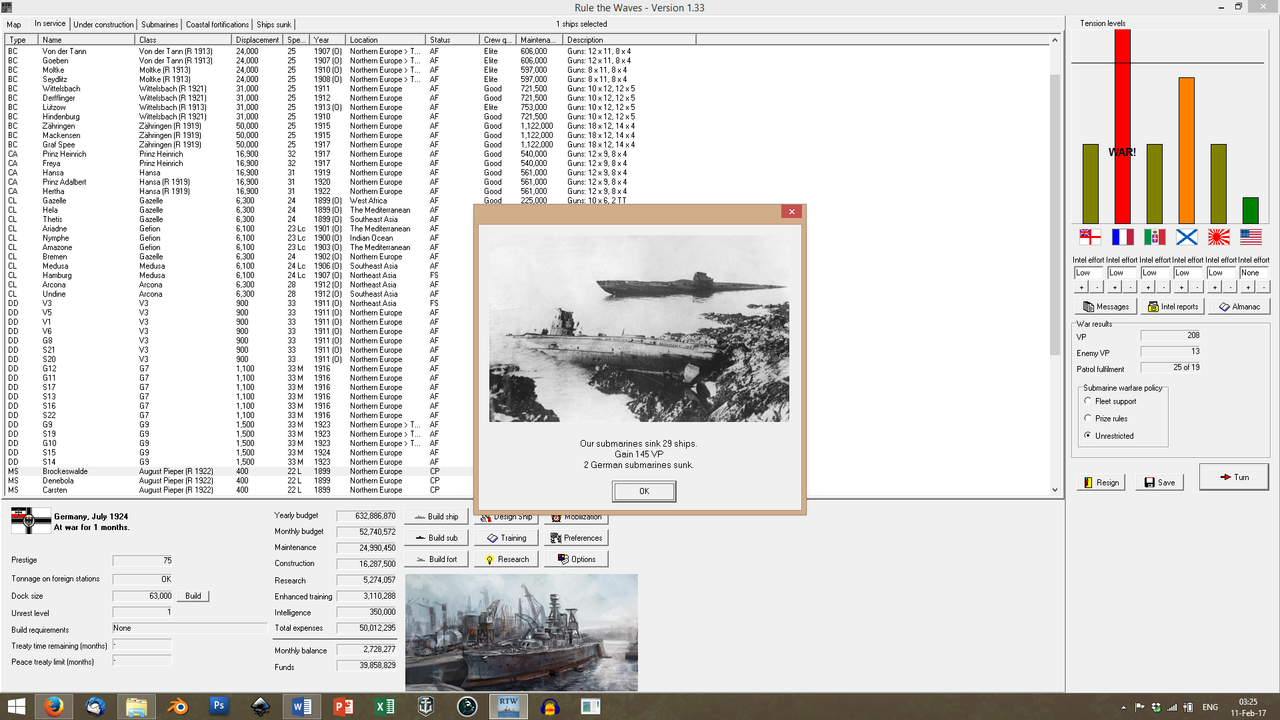
July: first submarine reports come in.
It is a
slaughter. With the French ports still open (Galster does not yet attempt to enforce a blockade), the
U-Boote have prey to feast upon. That's 180k tons of merchant traffic sent to the bottom, in the most vicious month in submarine warfare history since the Anglo-German war.
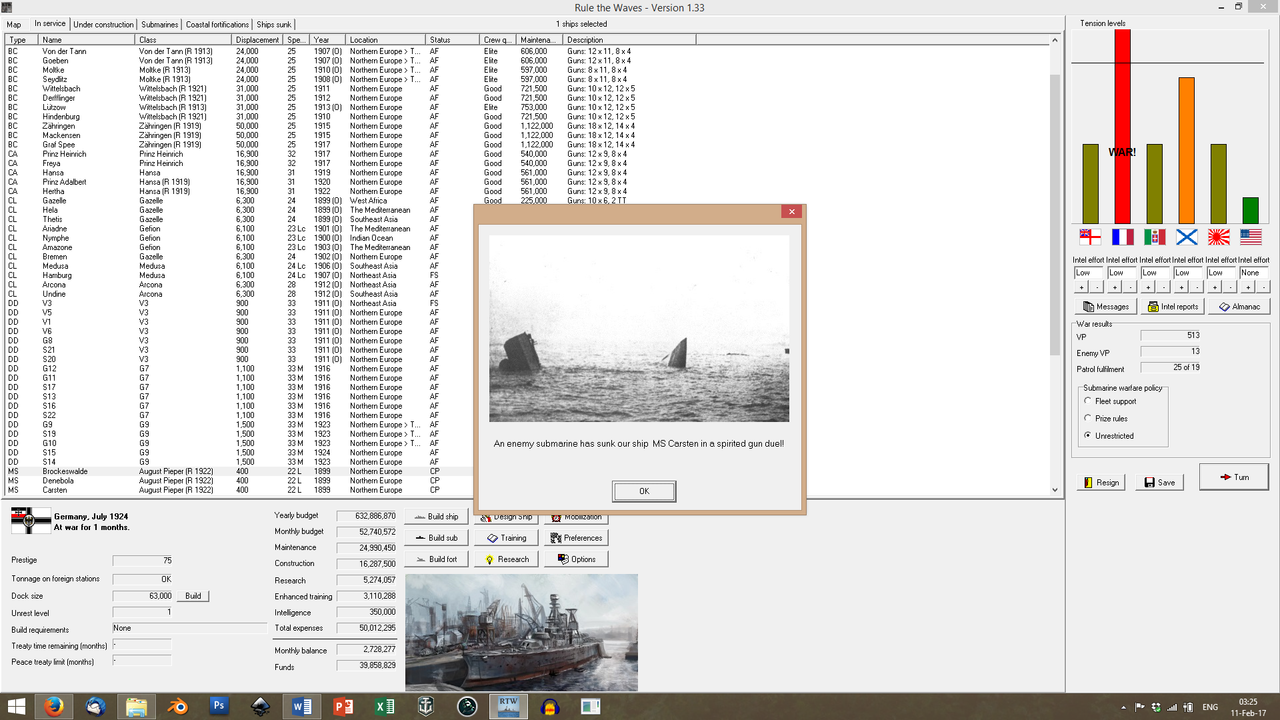
The French strike back, sinking the
Carsten near Helgoland.
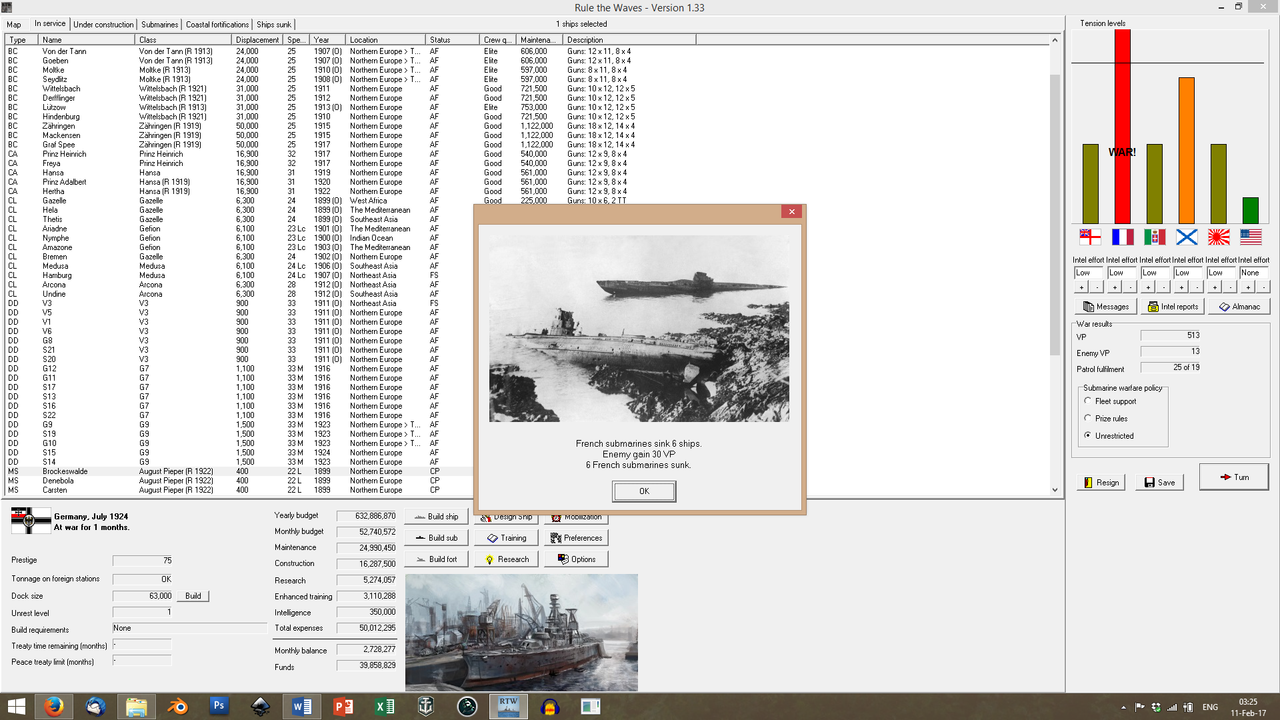
...and putting six German merchantmen down. A valiant effort, for a bunch of garlic-chewers, but it cannot compare with German efficiency!
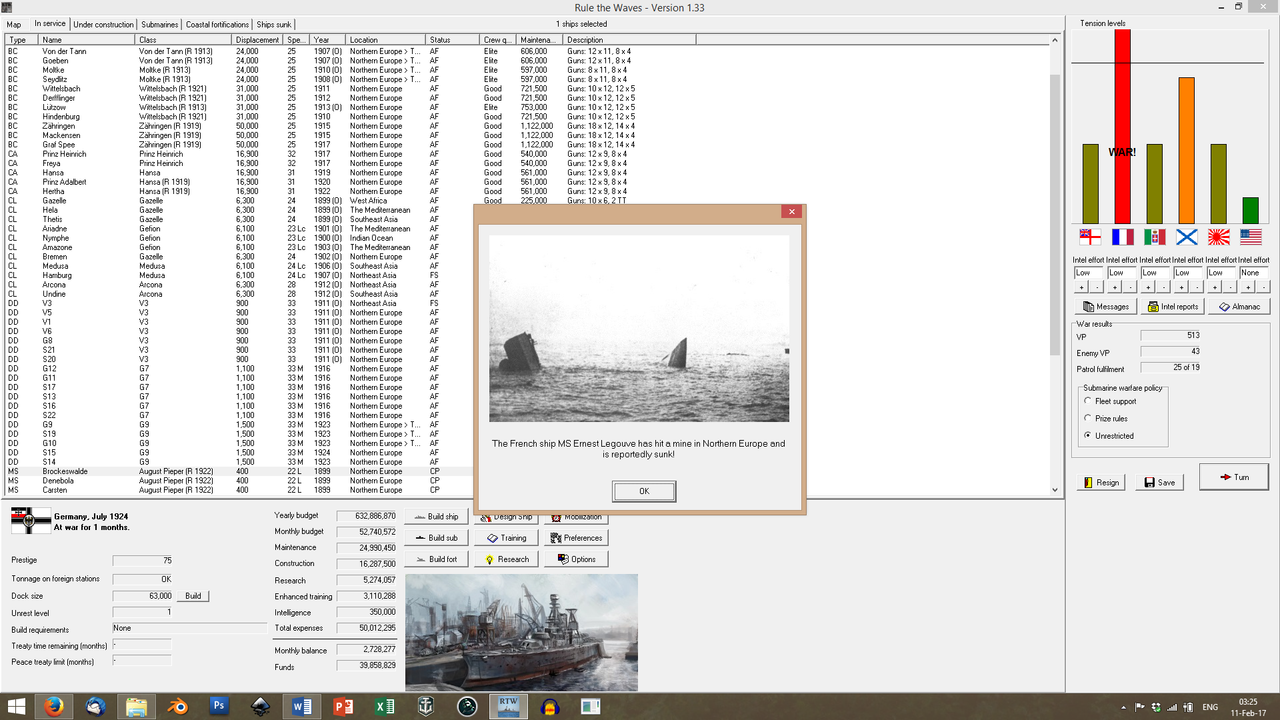
And their ASW ships are
useless.
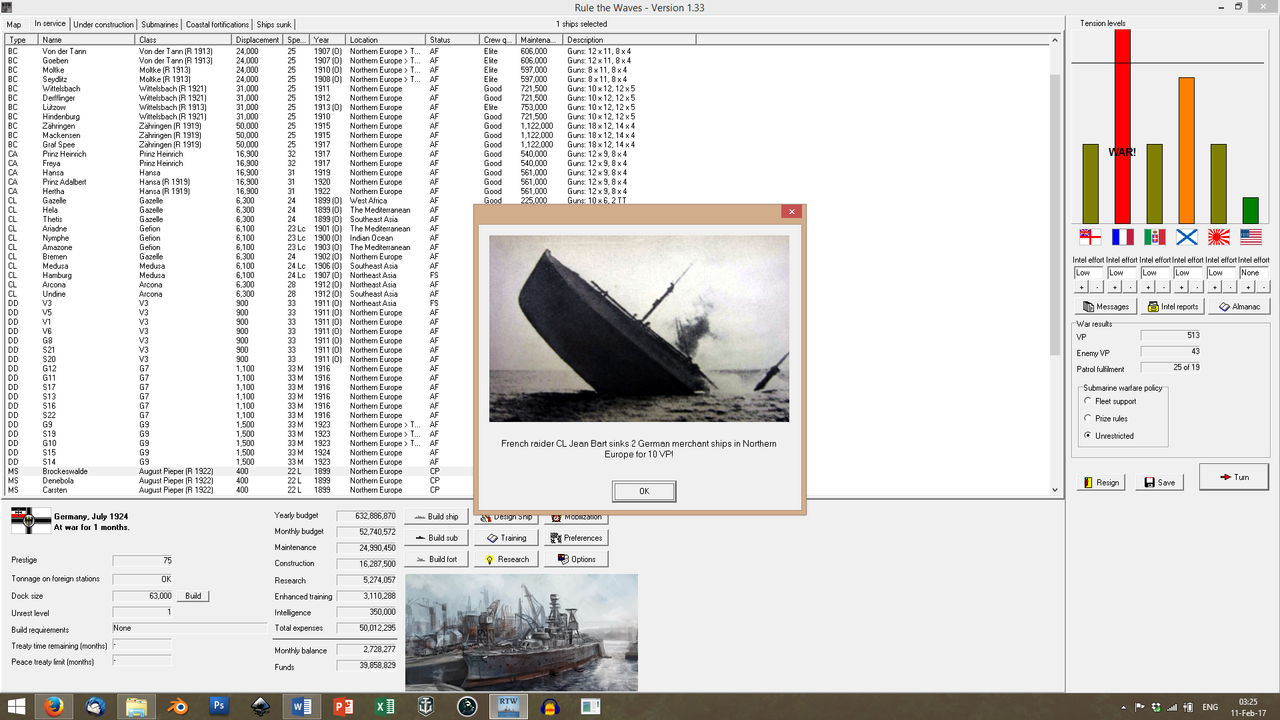
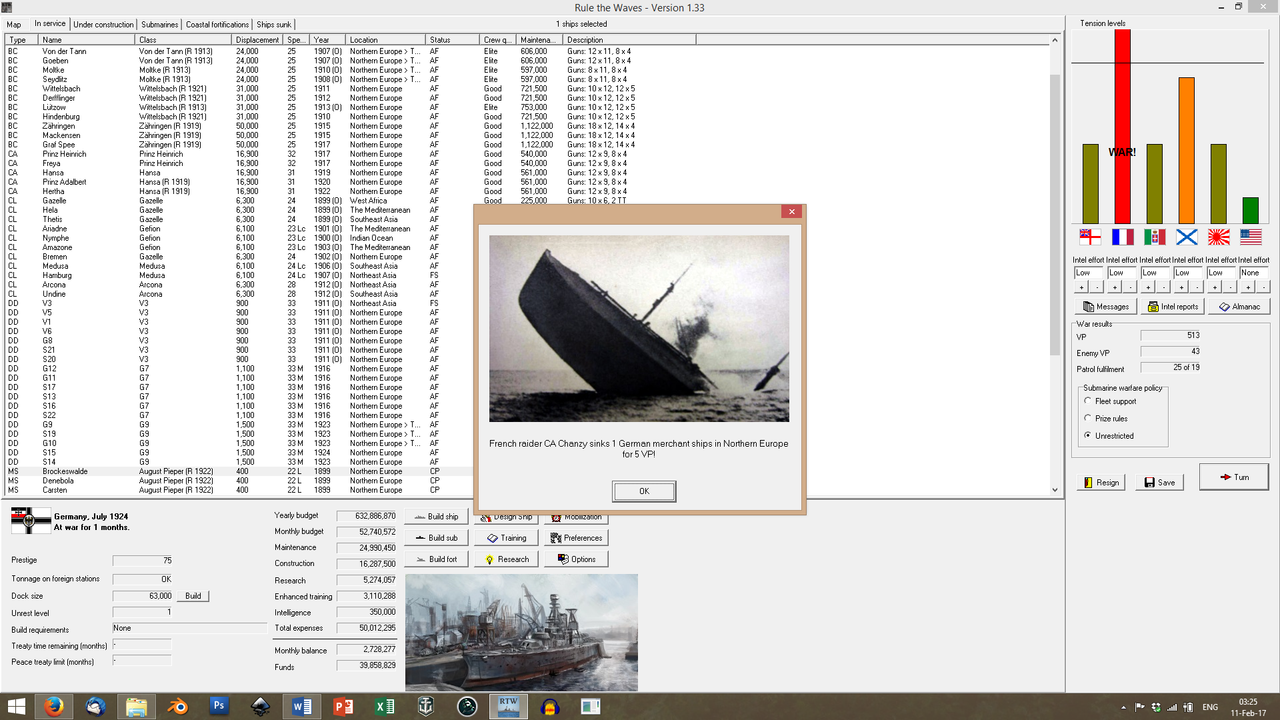
Their surface raiders also yield minimal results. With five German heavy cruisers standing by in the North Sea and with the
G9s falling into regular patrols, the French ships have a very narrow window of opportunity to hunt down their prey.
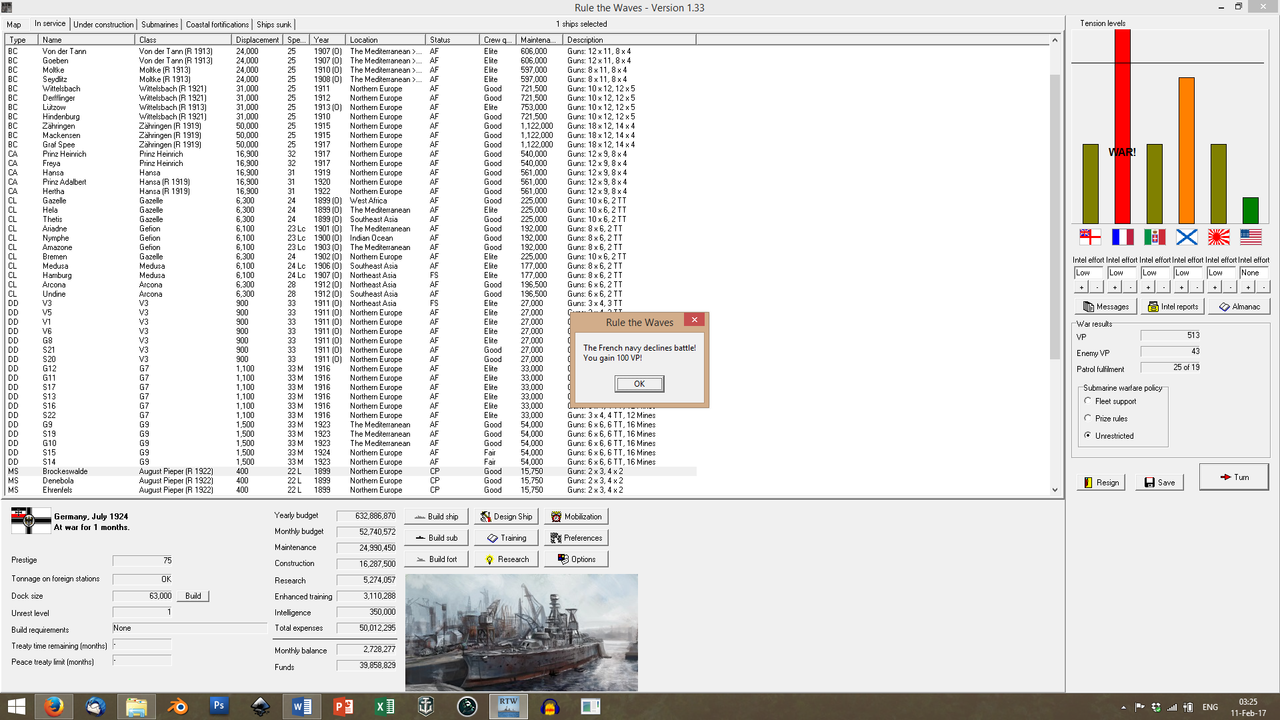
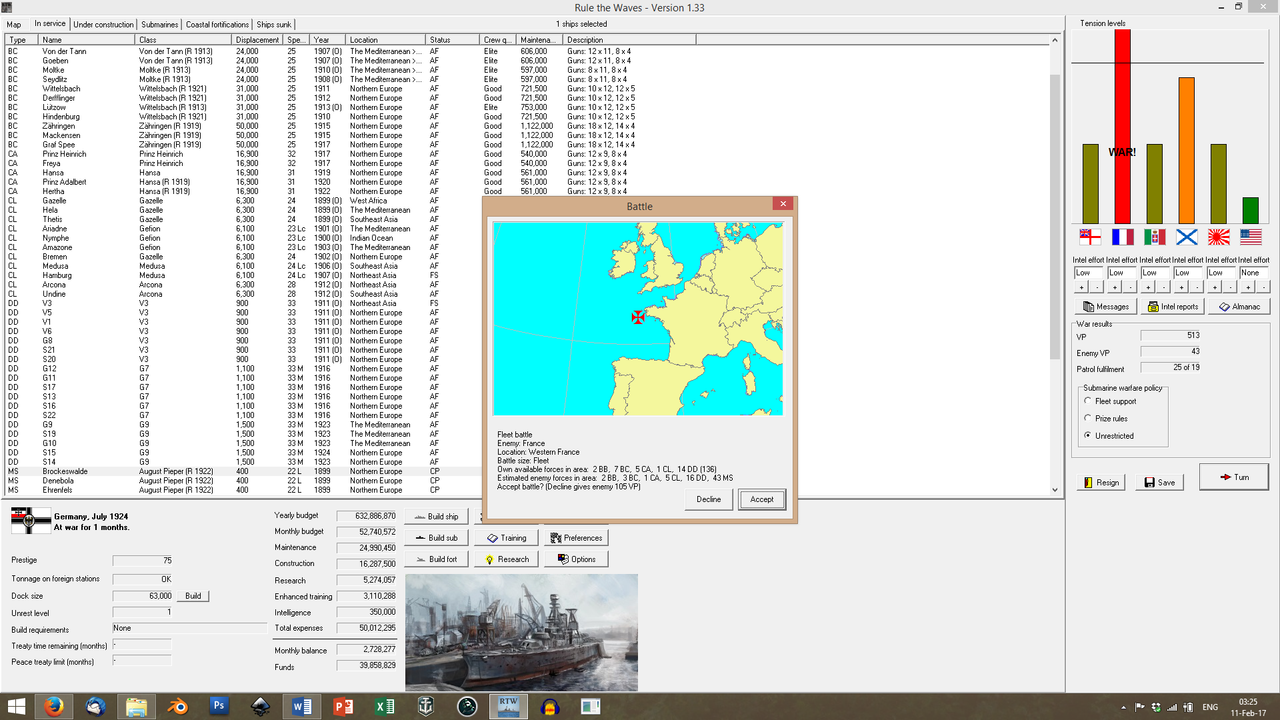
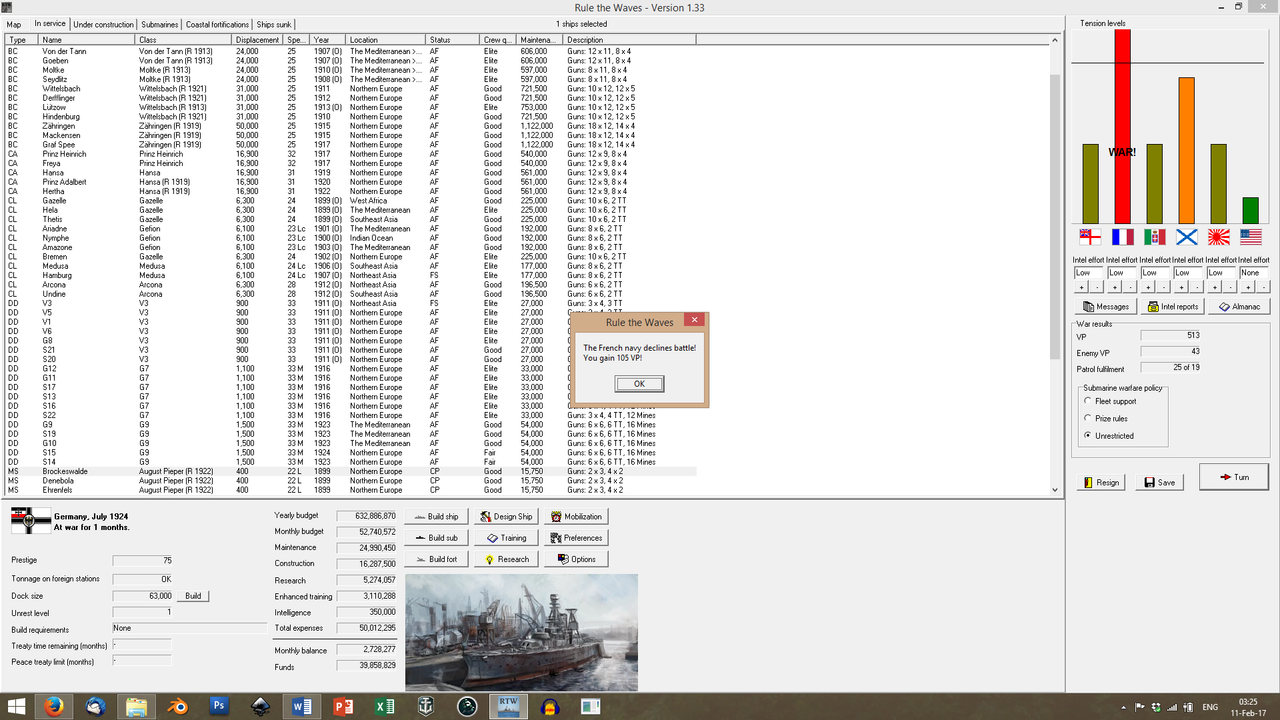
Throughout July and August, this situation continues. Streseman is getting reports that the Russian army is mobilising; and several German Army Divisions are deployed in preparation on the eastern borders. Meanwhile, the reinforced French fortifications on the Western Front are giving the Germans problems.
The French Fleet adamantly refuses to engage the German forces - and Galster tightens the noose, establishing a blockade. The German
Schlachtkreuzer in the Mediterranean have locked down the southern harbours; the
Hochseeflotte blocks traffic in the north. The French now
need to respond - or starve.
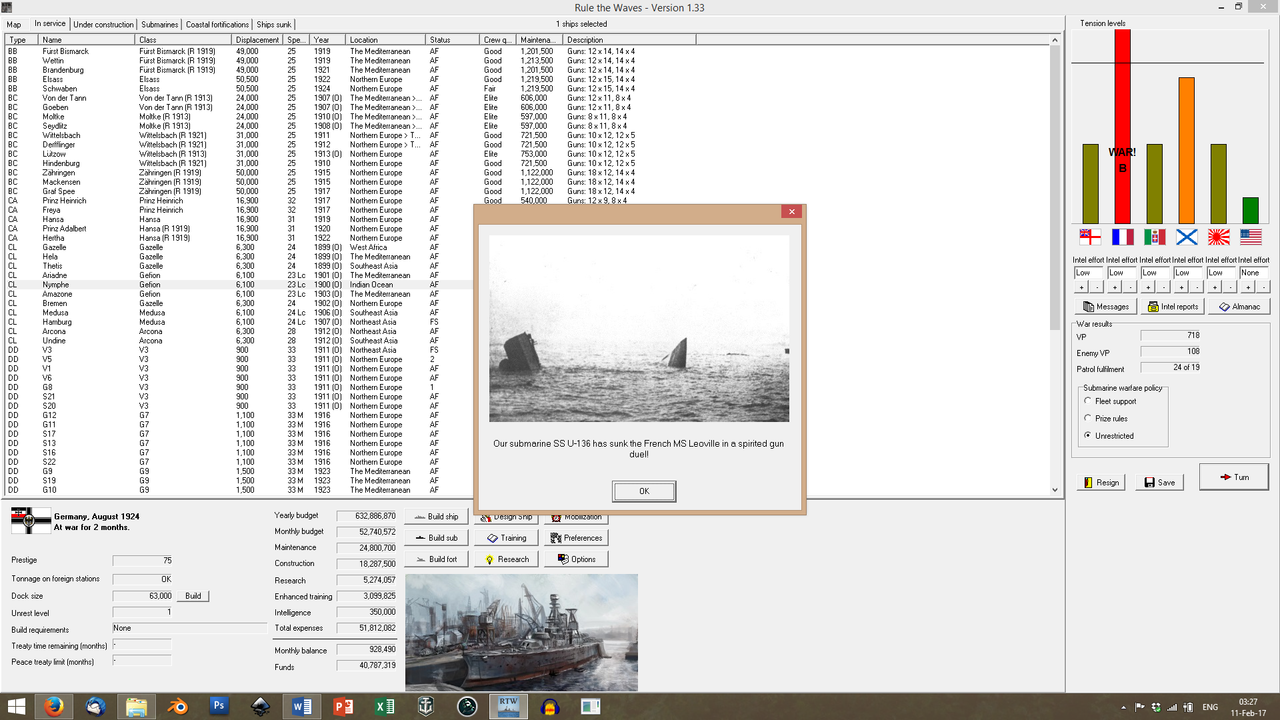
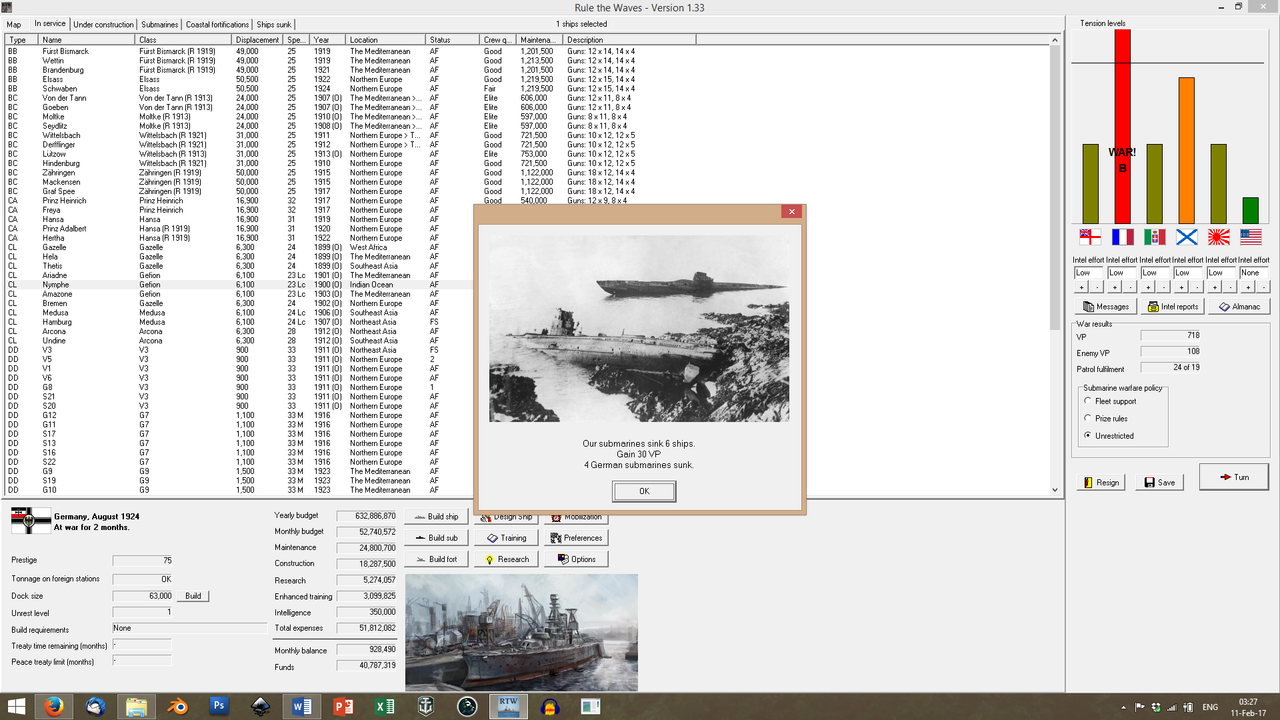
The German submarines now turn their attention to French fleet assets. The
U-136 pounds a French minesweeper into submission with her 4-inch gun; and six merchantmen are sunk in opportunistic actions.
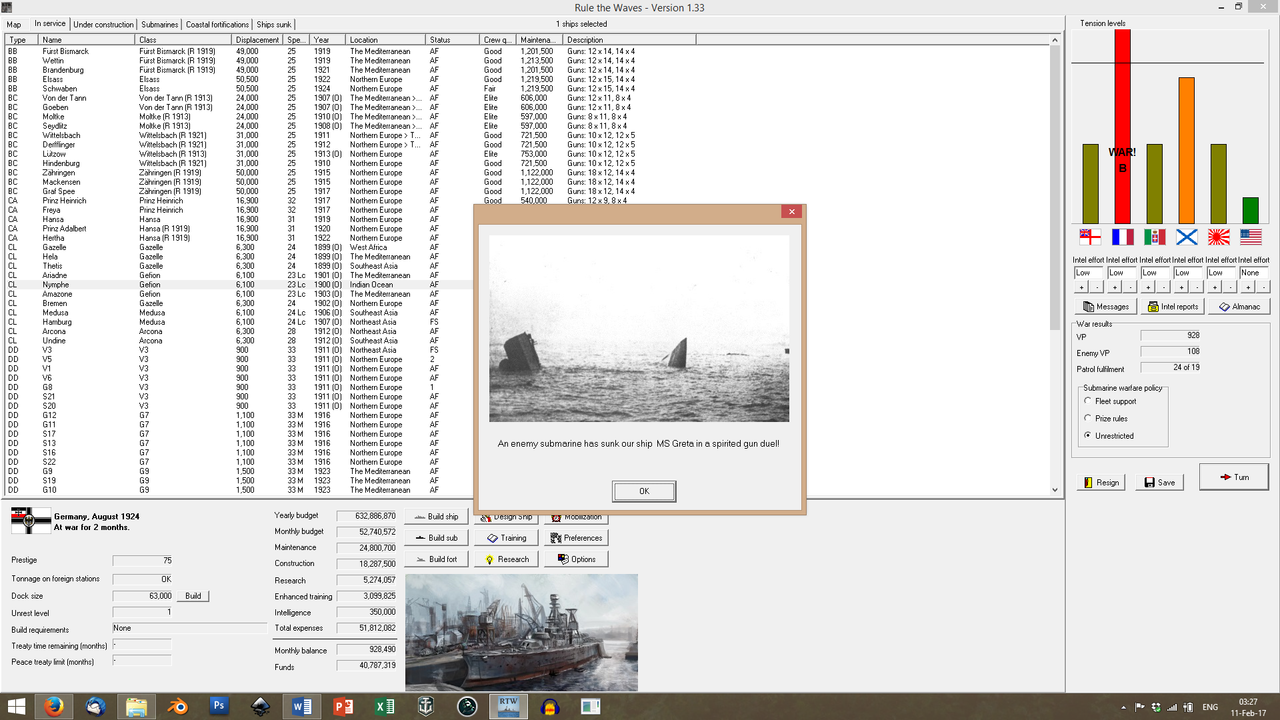
The French try to bite back: the submarine
Mameli sinks the
Greta in the Mediterranean...
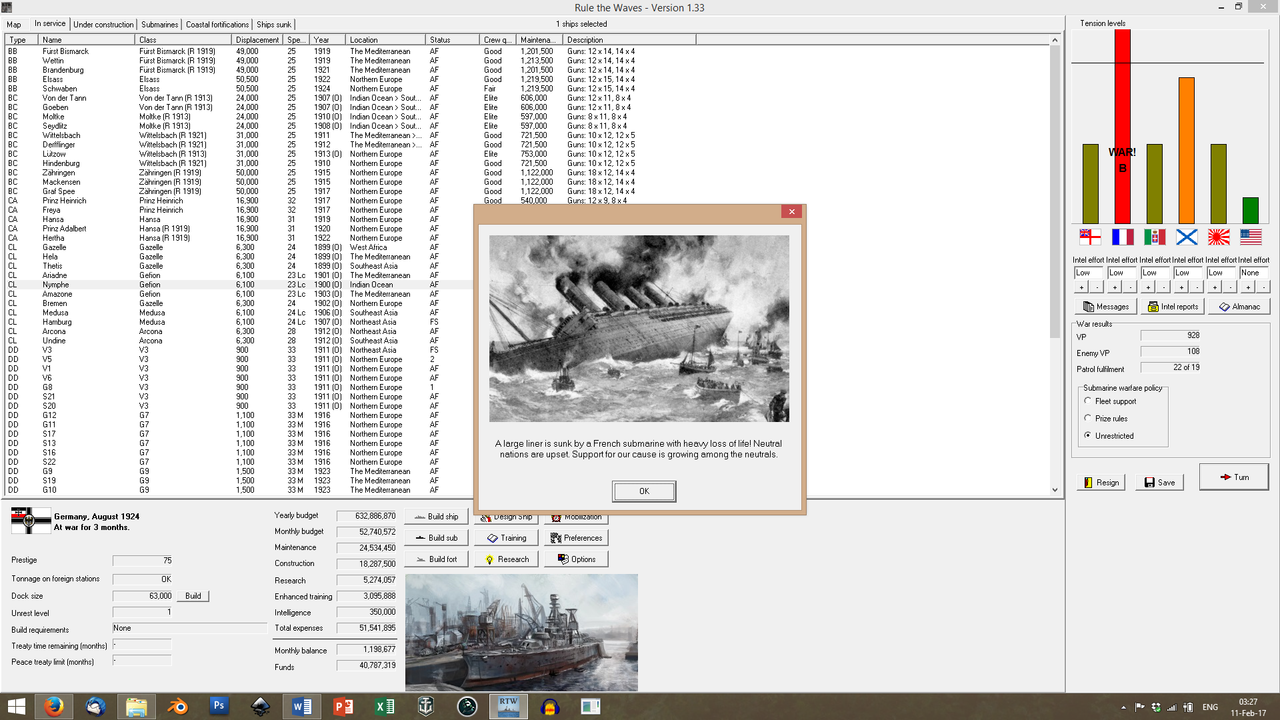
...and on the 8th of August, the
Corsaire sinks the
RMS Scythia, a British liner.
870 dead.
Incompetent French.